The average cost of Prostate Cancer Treatment in Bangkok approximately starts from USD 17000
Treatment cost
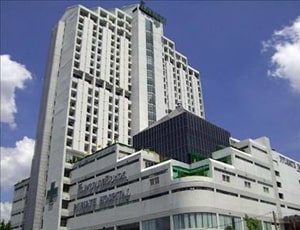
Types of Prostate Cancer Treatment in Piyavate Hospital and its associated cost
| Treatment Option | Approximate Cost Range (USD) | Approximate Cost Range (THB) |
|---|---|---|
| Prostate Cancer Treatment (Overall) | 9172 - 22939 | 324252 - 785637 |
| Surgery | 6760 - 13280 | 242778 - 475427 |
| Radiation Therapy | 4450 - 11309 | 160926 - 405874 |
| Brachytherapy | 6736 - 13589 | 240373 - 488163 |
| Hormone Therapy | 1120 - 3333 | 39845 - 118933 |
| Chemotherapy | 1713 - 4528 | 61452 - 159028 |
| Immunotherapy | 5632 - 11022 | 197118 - 394359 |
| Targeted Therapy | 6716 - 17045 | 241390 - 609501 |
| Palliative Care | 909 - 2806 | 32711 - 101265 |
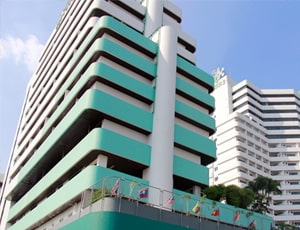
Types of Prostate Cancer Treatment in Phyathai 2 International Hospital and its associated cost
| Treatment Option | Approximate Cost Range (USD) | Approximate Cost Range (THB) |
|---|---|---|
| Prostate Cancer Treatment (Overall) | 8926 - 22464 | 317327 - 802449 |
| Surgery | 6817 - 13758 | 238345 - 470784 |
| Radiation Therapy | 4503 - 11159 | 162455 - 402516 |
| Brachytherapy | 6822 - 13659 | 239839 - 490537 |
| Hormone Therapy | 1134 - 3312 | 40826 - 121506 |
| Chemotherapy | 1687 - 4463 | 60766 - 160352 |
| Immunotherapy | 5661 - 11212 | 197897 - 395282 |
| Targeted Therapy | 6692 - 17229 | 241775 - 596477 |
| Palliative Care | 919 - 2816 | 32797 - 100244 |
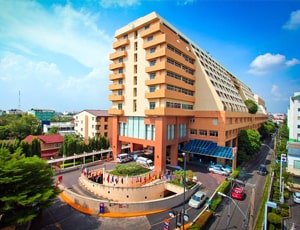
Types of Prostate Cancer Treatment in Vejthani Hospital and its associated cost
| Treatment Option | Approximate Cost Range (USD) | Approximate Cost Range (THB) |
|---|---|---|
| Prostate Cancer Treatment (Overall) | 9072 - 22527 | 315139 - 809010 |
| Surgery | 6779 - 13638 | 243259 - 480628 |
| Radiation Therapy | 4562 - 11279 | 161561 - 400238 |
| Brachytherapy | 6652 - 13292 | 243421 - 471642 |
| Hormone Therapy | 1140 - 3411 | 40384 - 120837 |
| Chemotherapy | 1684 - 4570 | 60568 - 162927 |
| Immunotherapy | 5723 - 11117 | 201764 - 404200 |
| Targeted Therapy | 6834 - 17163 | 237134 - 613165 |
| Palliative Care | 906 - 2816 | 32360 - 98639 |

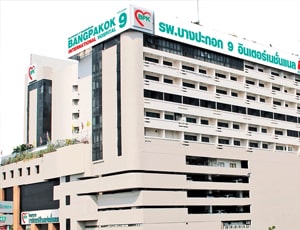
Types of Prostate Cancer Treatment in Bangpakok 9 International Hospital and its associated cost
| Treatment Option | Approximate Cost Range (USD) | Approximate Cost Range (THB) |
|---|---|---|
| Prostate Cancer Treatment (Overall) | 9183 - 22340 | 322124 - 789559 |
| Surgery | 6723 - 13584 | 237267 - 484914 |
| Radiation Therapy | 4487 - 11469 | 160305 - 396472 |
| Brachytherapy | 6717 - 13225 | 245063 - 471781 |
| Hormone Therapy | 1127 - 3355 | 40760 - 122884 |
| Chemotherapy | 1651 - 4493 | 60749 - 158074 |
| Immunotherapy | 5679 - 11121 | 200029 - 407761 |
| Targeted Therapy | 6818 - 17023 | 245381 - 607560 |
| Palliative Care | 918 - 2801 | 32329 - 101995 |
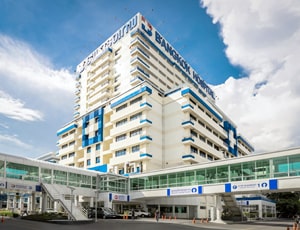
Types of Prostate Cancer Treatment in Bangkok Hospital and its associated cost
| Treatment Option | Approximate Cost Range (USD) | Approximate Cost Range (THB) |
|---|---|---|
| Prostate Cancer Treatment (Overall) | 8984 - 22847 | 317300 - 807468 |
| Surgery | 6832 - 13441 | 239276 - 479631 |
| Radiation Therapy | 4592 - 11479 | 158856 - 403666 |
| Brachytherapy | 6806 - 13512 | 237698 - 489648 |
| Hormone Therapy | 1126 - 3426 | 40588 - 117691 |
| Chemotherapy | 1674 - 4453 | 59910 - 162775 |
| Immunotherapy | 5686 - 11010 | 204674 - 399586 |
| Targeted Therapy | 6635 - 16866 | 237662 - 609798 |
| Palliative Care | 891 - 2825 | 31414 - 99955 |
The prostate is a gland in the male reproductive system, which makes fluid that forms an essential part of the semen. Prostate cancer starts when cells of the prostate glands begin to grow abnormally
Prostate cancer is one of the leading cancers in men above the age of 60. In most of the cases, it is slow growing and may even go undetected and do not cause any problem. However, in some cases, it could be aggressive and cancer cells can spread to other parts of the body (metastatic prostate cancer)
Prostate cancer is a very slow growing disease and starts with tiny alterations in the shape and size of the prostate gland cells. The prostate cancer risk increases with age and it is rarely observed before the age of 40. That is the main reason why many men die of old age, without ever knowing that they had prostate cancer.
There is no direct prostate cancer causes. However, there are some factors that can increase the risk of prostate cancer, including the following:
Usually, prostate cancer means the cancer of prostate gland cells called prostatic intraepithelial neoplasia (PIN). Almost all the prostate cancers are adenocarcinomas, but there are some other types of prostate cancer as well, including the following:
Based on how abnormal the patterns of cancer cells look, prostate cancers are classified as:
There are no warning signs of prostate cancer. The symptoms of metastatic prostate cancer usually appear first in the region that the cancer cells have invaded.
After cancer causes the prostate gland to swell, the following signs of prostate cancer may be experienced:
In prostate cancer stages, the following symptoms may also be there:
Treatment for prostate cancer can be divided into early stage and advanced stage. Your doctor will choose the best suitable treatment for you, depending on the stage and classification of prostate cancer, your age, and overall health status. Although, your feelings, expected lifespan, and your opinion will play a major role in choosing the right kind of treatment.
The most common treatment options for prostate cancer include the following:
Watchful waiting or active surveillance
No immediate treatment is carried out, but the patient is followed up at regular intervals to see the progression of the disease. This method is used in elderly patients with short life expectancy and in case of an early disease.
The main type of prostate surgery is called radical prostatectomy. In this, cancerous tissues are removed by a surgical operation. A long cut in the abdomen is needed in this surgery, depending on the extent and stage of cancer.
However, a keyhole surgery for prostate cancer using a laparoscope or robot is also available. These treatments have good success rates but may result in certain long-term side effects such as sexual dysfunction, narrowing of the urethra, and urinary incontinence.
High-intensity beams are used in this treatment to destroy the cancer cells in the prostate. Radiotherapy can be administered via needles implanted into the prostate, under ultrasound guidance or as an external beam. Radiotherapy can be used after surgery if the resection of cancer tissue has not been completed.
There are two types of radiotherapy for prostate cancer:
In this, the radiation beams are shaped so that the region where they overlap is as close to the same shape as the organ that requires treatment. It minimizes healthy tissue exposure to radiation.
In this, the beams with variable intensity are used. It is an advanced form of conformal radiotherapy. It is usually delivered with the help of a computer-controlled linear accelerator.
Hormone therapy involves the use of medications that suppress testosterone levels. They are used as primary treatment and in advanced cases or Stage 4 prostate cancer.
Chemotherapy is a kind of advance drug treatment in which strong medications are used to kill the cancer cells and prevent it from spreading. It is used when the prostate cancer is not controlled by hormonal treatment. Chemotherapy is selected only for treatment of Stage 4 prostate cancer and when the patient can cope with it.
This treatment uses extremely cold temperatures to freeze and destroy cancer tissues in the prostate. Cryotherapy is the best option for treating recurrent prostate cancer, especially if initial radiation therapy did not kill enough cancer cells. The surgeon inserts an ultra-thin metal probe or needle into the prostate gland, from which a freezing liquid, such as liquid nitrogen or more commonly, argon gas, is infused into the prostate gland.
Some treatments such as radiofrequency and high intensity focused ultrasound (HIFU) are used to treat early prostate cancer or when the patient is not fit for a major surgery.
Ask your healthcare adviser for the best multiple options and choose the one that meets your expectations
Prostate Cancer Treatment cost in Bangkok starts from about $17000. Only some of the best and certified hospitals in Bangkok perform Prostate Cancer Treatmentation for international patients.
The Prostate Cancer Treatment package cost in Bangkok varies from one hospital to another and may offer different benefits. Some of the best hospitals for Prostate Cancer Treatment offer a comprehensive package that covers the end-to-end expenses related to investigations and treatment of the patient. Typically, the package cost of Prostate Cancer Treatment in Bangkok includes the expenses related to the surgeon's fee, anesthesia, hospital, meals, nursing and ICU stay. Stay outside the package duration, port-operative complications and diagnosis of a new condition may further increase the Prostate Cancer Treatment cost in Bangkok.
There are many hospitals that perform Prostate Cancer Treatment in Bangkok. The top hospitals for Prostate Cancer Treatment in Bangkok include the following:
The recovery of the patient many vary, depending on several factors. However, on an average, patient is supposed to stay for about 17 days in the country after discharge. This time frame is important to ensure that the surgery was successful and the patient is fit to fly back.
Apart from the cost of Prostate Cancer Treatment, the patient is also required to pay additionally for daily meals and guest house accommodation. These are the chanrges for daily meals and hotel stay outside the hospital. The extra charges may vary from 25 USD.
The patient has to spend about 4 Days in the hospital after Prostate Cancer Treatment for proper recovery and to get clearance for discharge. The doctors team review the patient's recovery during this time with the help of blood tests and imaging scans. Once they feel that everything is on track, the patient is discharged.
There are about 5 Hospitals Prostate Cancer Treatment hospitals in Bangkok that are best known for their services. These hospitals have proper infrastructure for the treatment of patients who require Prostate Cancer Treatment. Additionally, these hospitals are known to comply with the international standards as well as local legal requirements for the treatment of patients.
Some of the most sought after doctors for Prostate Cancer Treatment in Bangkok are:
Bangkok in Thailand is a sought-after destination for medical tourism. On average, around 2.5 million international patients visit Thailand every year, mostly to Bangkok to avail healthcare services. The number of medical tourists visiting Bangkok continues to rise because of the affordable and advanced treatments available in the city. Bangkok is renowned for its high standard of medical technology and globally trained doctors. In Bangkok, patients can expect to save about 50-70% of the cost when compared to countries like Australia and US. In addition to competitive prices, hospitals in Bangkok offer shorter waiting times to international patients. Over 20 hospitals in Bangkok have received accreditation from the Joint Commission International (JCI) for setting benchmarks in healthcare. The hospitals in Bangkok also have a long-standing tradition of focusing on patient-centric care. They provide interpretation services in various languages so that patients can communicate effectively with their doctors.
Bangkok offers technologically advanced hospitals that are well-furnished to take care of all the healthcare needs of the patients. Some of the top hospitals in Bangkok are:
Bangkok has a pool of skilled and qualified doctors who have completed training at some of the most prestigious institutes across the world. Some of the top doctors in Bangkok are:
Bangkok has excellent connectivity with the rest of the world by air. There are two airports in Bangkok: Suvarnabhumi, which is 25 kilometers to the east, and Don Mueang, which is 24 kilometers to the north of Bangkok. You can take a flight from your city to these airports and then travel to downtown Bangkok by bus or train. In case you wish to avail treatment here, we can assist you in planning your medical travel.